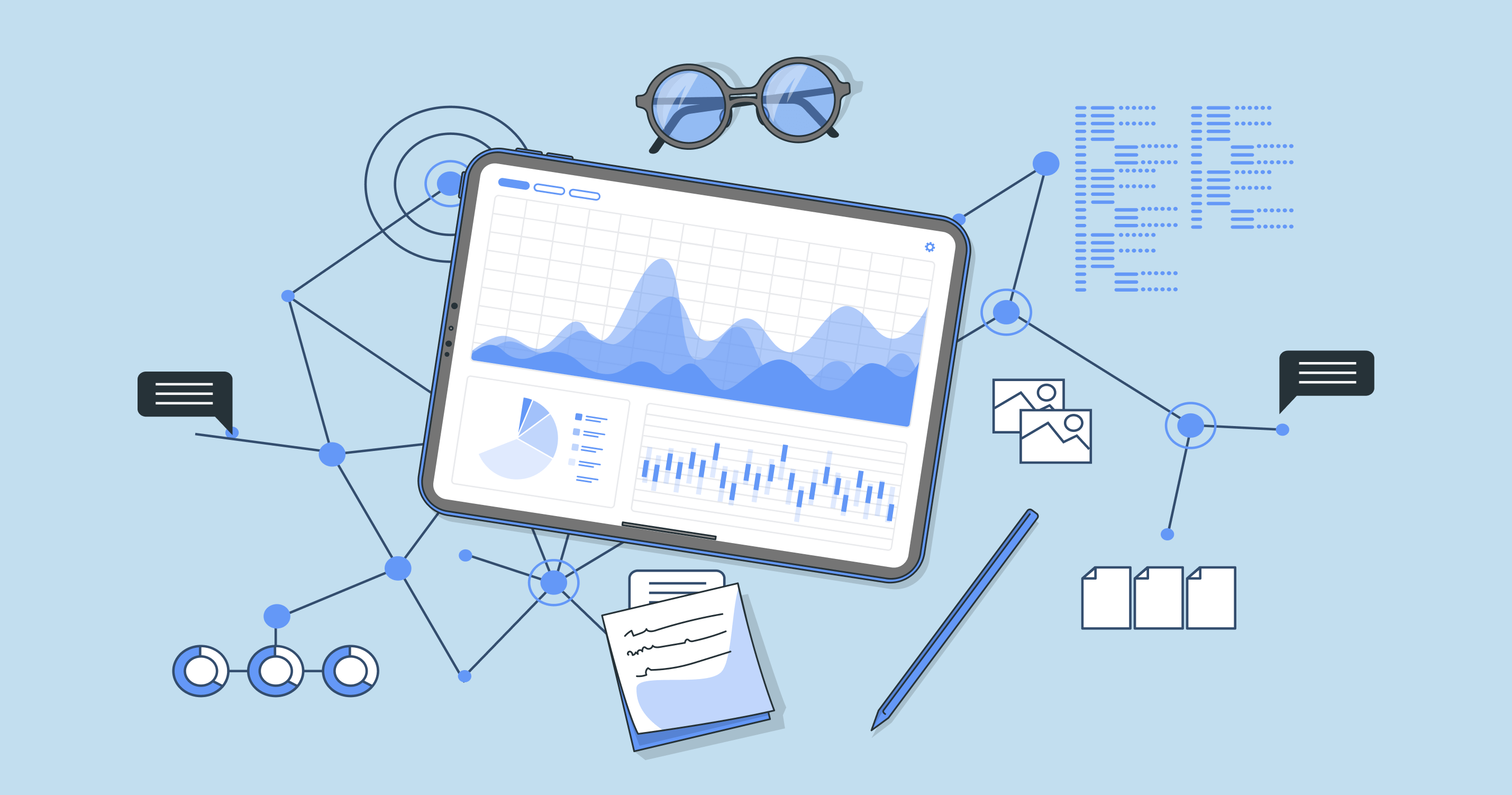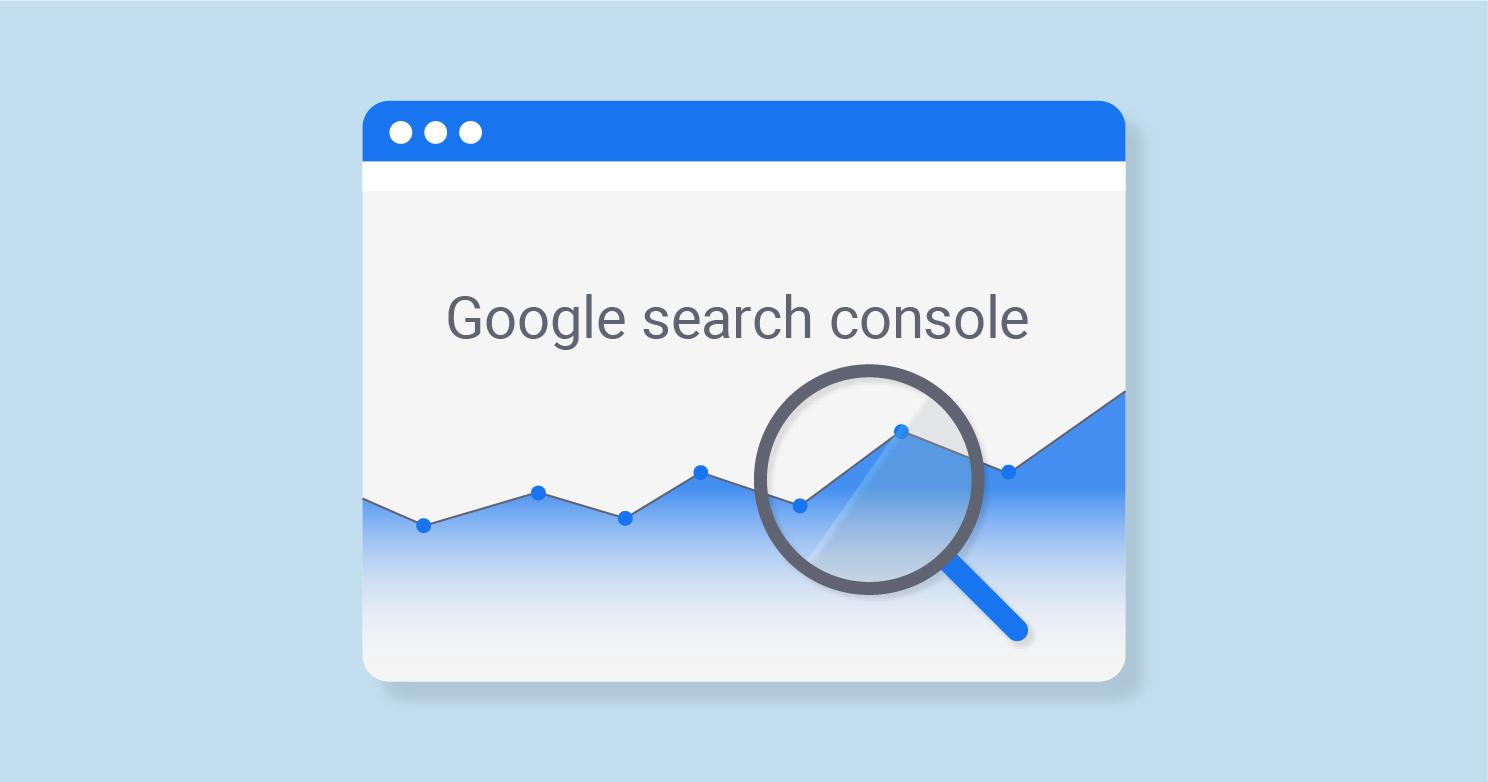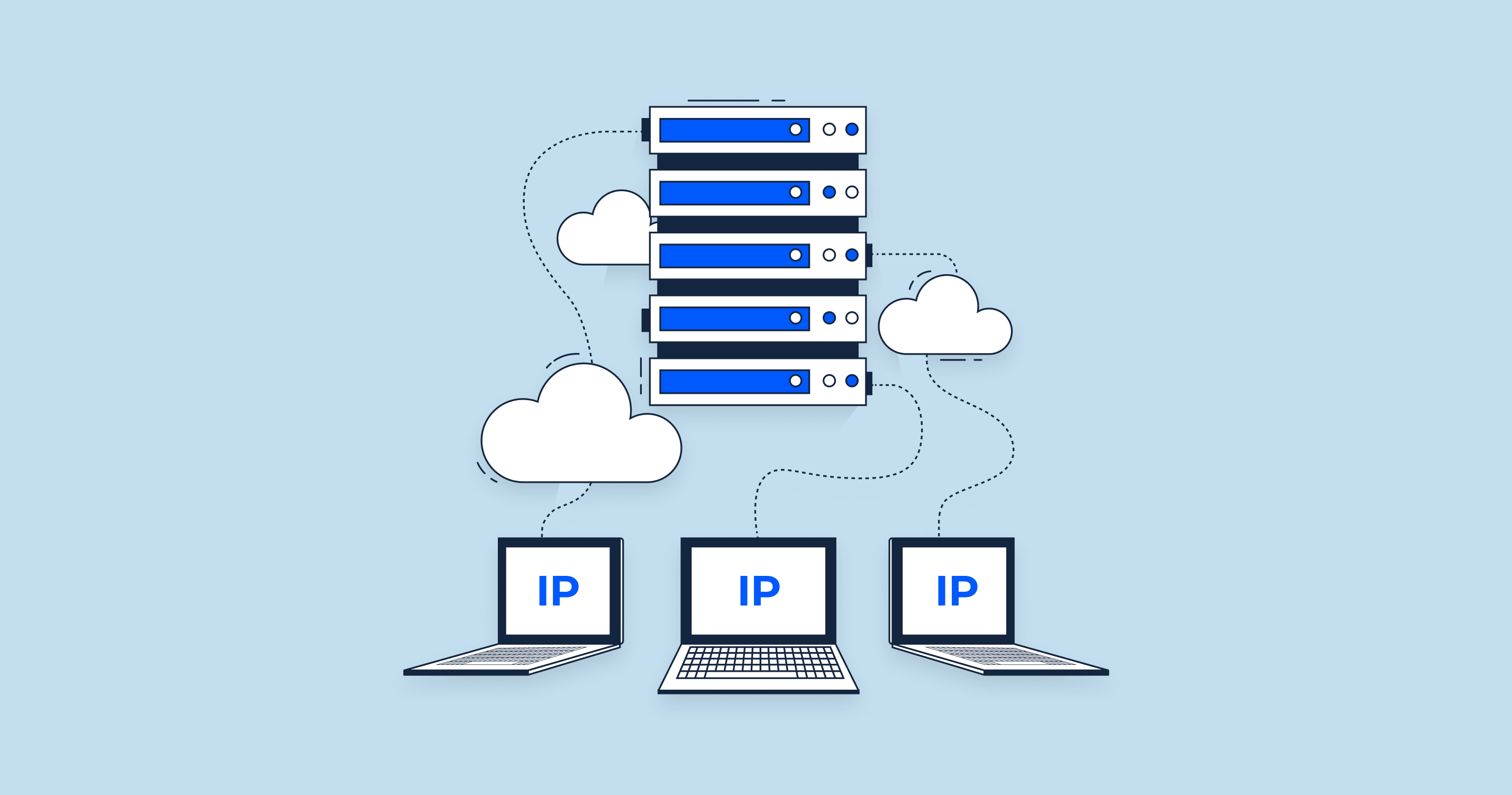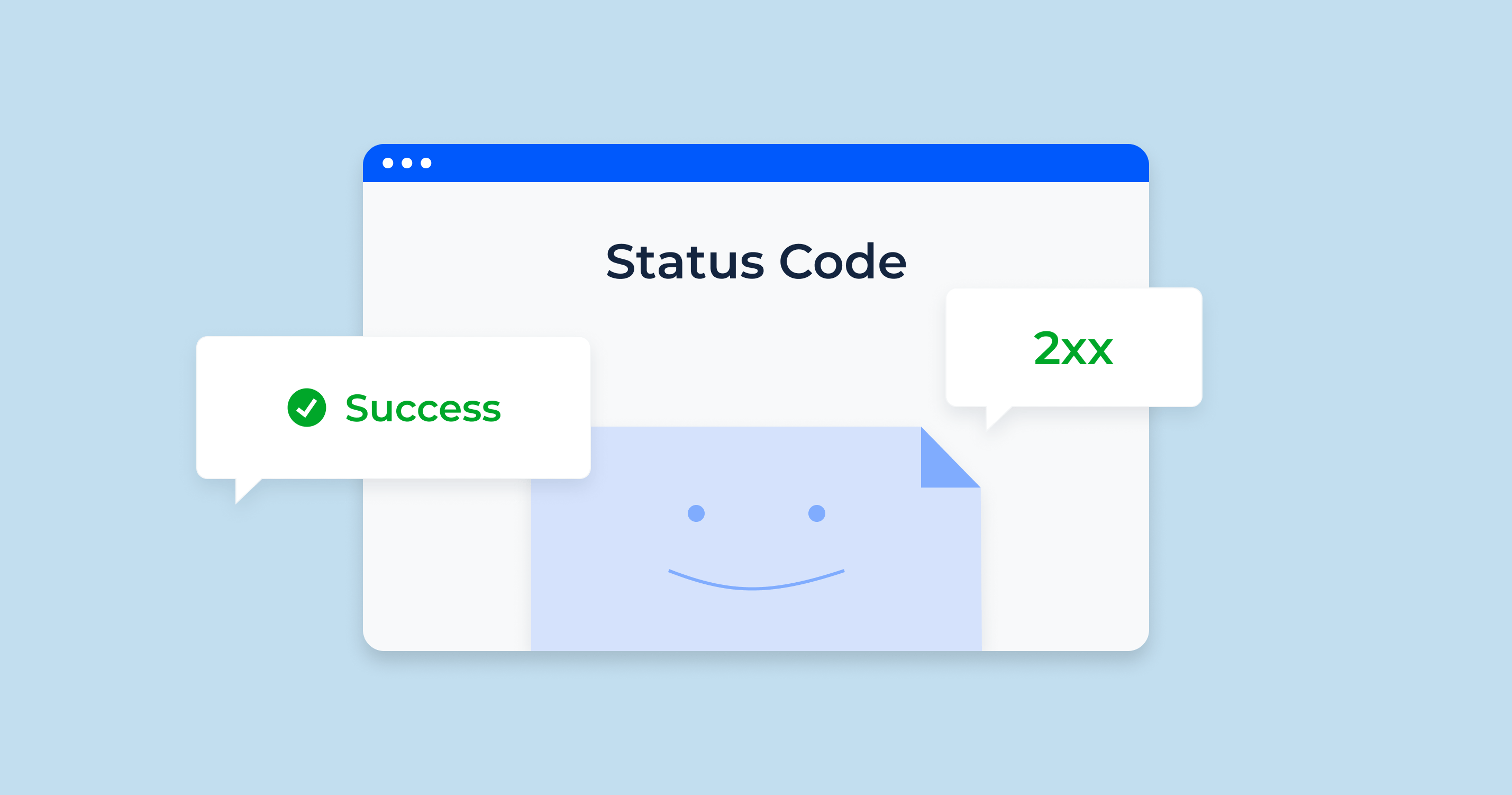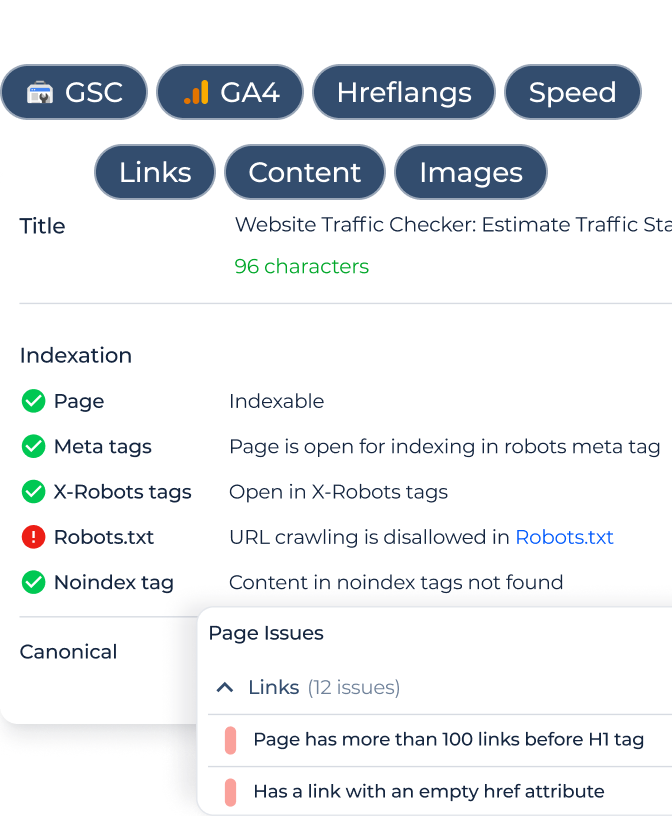What is SEO Monitoring?
SEO Monitoring continuously tracks and analyzes various metrics and performance indicators of a website’s search engine optimization (SEO) efforts. This practice involves regularly observing keyword rankings, organic traffic, backlinks, site performance, and other critical factors that influence a website’s visibility and ranking on search engine results pages (SERPs).
Key Components of SEO Monitoring
- Technical SEO Audits: Regularly check the website for technical issues such as broken links, slow load times, or mobile usability problems.
- Keyword Tracking: Monitoring the rankings of targeted keywords to assess their performance and adjust strategies accordingly.
- Organic Traffic Analysis: Analyzing the amount and quality of traffic coming from search engines.
- Backlink Monitoring: Keeping track of backlinks to ensure their quality and detect any harmful links that may affect the site’s reputation.
- Competitor Analysis: Observing competitor activities to identify opportunities and threats.
- Content Performance: Evaluating the effectiveness of content in attracting and retaining visitors.
- Algorithm Updates: Staying informed about search engine algorithm changes and adjusting strategies to maintain or improve rankings.
- User Behavior Metrics: Analyzing user engagement metrics like bounce rate, time on site, and conversion rates to optimize the user experience.
Why SEO Monitoring is Important
Here are the key reasons why SEO Monitoring is important:
1. Maintain Search Engine Rankings
Regular monitoring helps ensure that your website maintains its ranking positions for key search terms. Any sudden drops can be quickly identified and addressed. Search engines frequently update their algorithms. Monitoring helps you stay aware of these changes and adapt your SEO strategies accordingly.
2. Improve Organic Traffic
By tracking which pages perform best, you can refine your content strategy to focus on what works, attracting more organic traffic.
If there’s a sudden drop in traffic, monitoring can help pinpoint the cause, whether it’s a technical issue, a penalty, or something else.
3. Enhance User Experience
Monitoring can identify issues such as broken links, slow load times, or mobile usability problems, all of which impact user experience and search rankings.
Metrics like bounce rate, time on site, and conversion rates offer insights into how users interact with your site, allowing you to make data-driven improvements.
4. Stay Ahead of Competitors
Keeping an eye on competitor activities and rankings helps you understand what’s working for them and allows you to adjust your strategies to stay competitive.
Monitoring helps you stay informed about trends and changes in your industry, allowing you to adapt your SEO efforts accordingly.
5. Identify and Fix Issues Promptly
Continuous monitoring allows for the immediate identification and resolution of issues before they escalate and cause significant harm to your rankings or traffic.
By spotting potential problems early, you can take preventative measures to avoid penalties or other negative impacts.
6. Maximize ROI on SEO Investments
Regular monitoring provides clear insights into which SEO activities are delivering the best results, helping you allocate resources more effectively.
Based on performance data, you can fine-tune your SEO strategies to improve outcomes and ensure that your investments yield the highest possible returns.
7. Adapt to Changing Environments
The digital landscape is always evolving. SEO monitoring helps you keep up with changes in user behavior, technology, and search engine algorithms.
Being aware of these changes allows you to adapt quickly, ensuring that your SEO efforts remain effective and relevant.
Best SEO Monitoring Tools
1. Sitecheckers SEO Monitoring Dashboard
The SEO Monitoring Dashboard provides essential metrics for monitoring your website’s performance. Integrating Google Analytics with the Search Console allows you to view all important metrics on a single dashboard. Key data points include overall traffic, organic traffic, visibility percentage, and indexed pages. Users can monitor website score, impressions, clicks, average position, click-through rate (CTR), ranked keywords, and ranked pages.

2. Site Monitoring
The SEO monitoring system provides comprehensive data on your website’s performance, including tracking all changes such as new and deleted pages, monitoring added and removed issues to maintain site health, and receiving an overall score reflecting your site’s performance. Keep all essential metrics in one place for efficient website management and optimization.
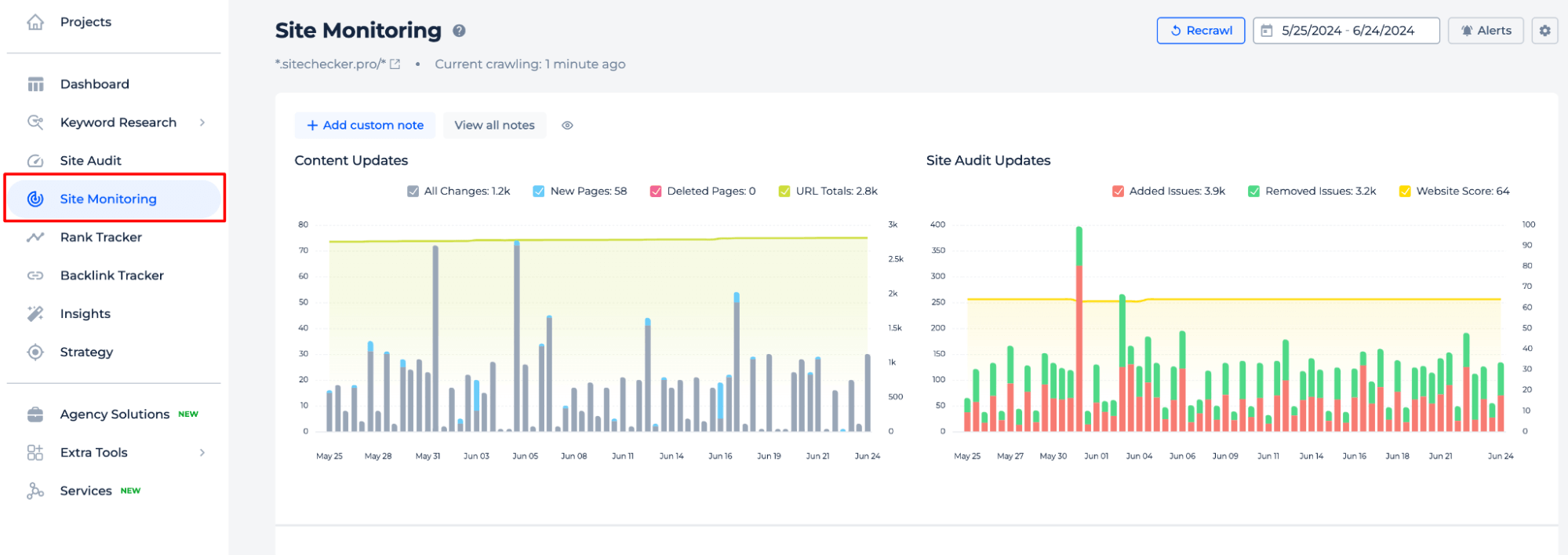
The Updates table provides detailed insights into your website’s performance by tracking changes such as orphan pages, modified Twitter cards, content updates, etc. It allows you to filter updates by category, priority, event, and page, ensuring you can focus on the most critical aspects. This feature helps you efficiently monitor and improve your website’s SEO and overall performance.
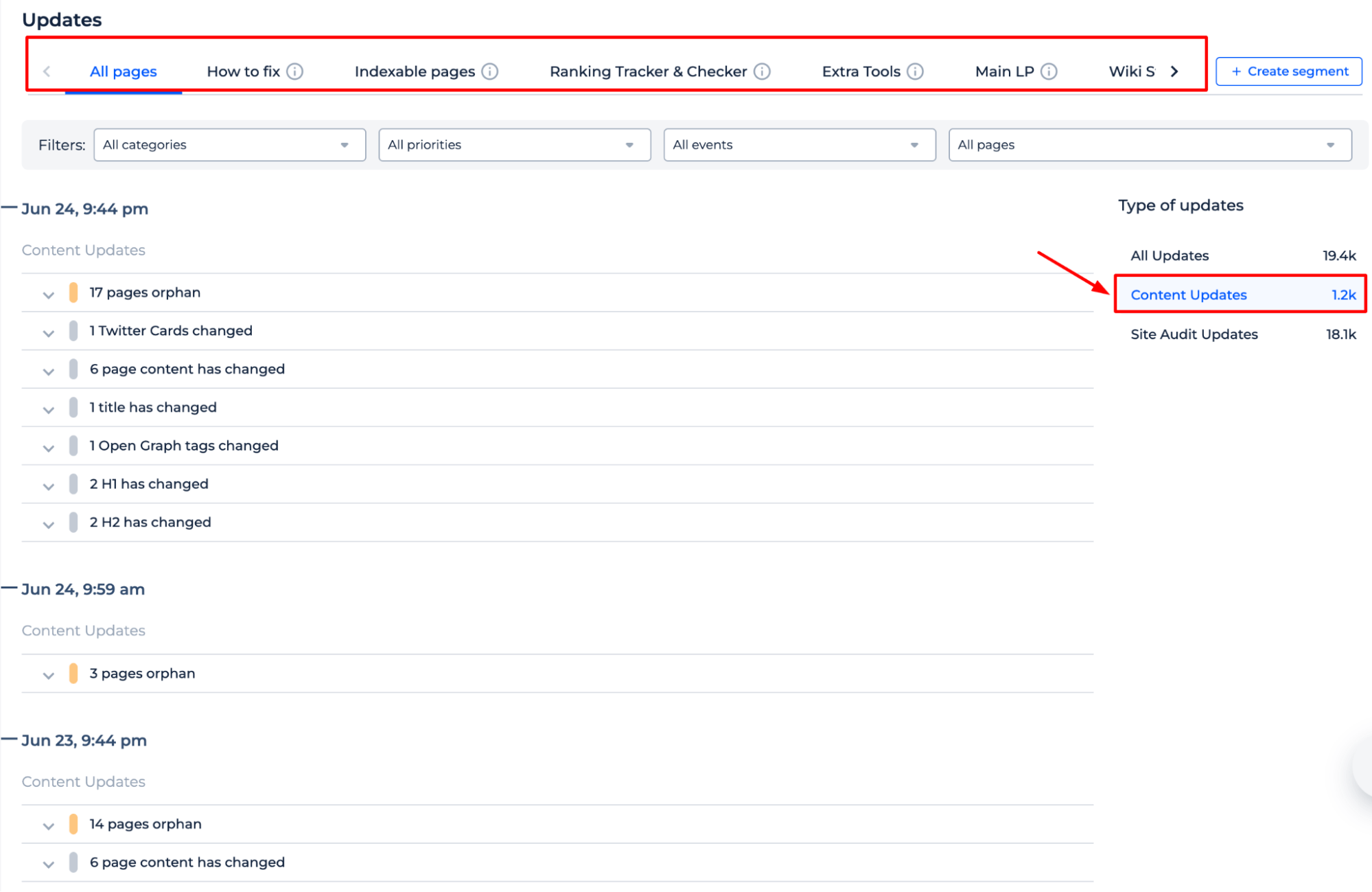
SEO Change Monitoring provides detailed insights into your website’s performance issues, such as image sizes, internal linking, broken links, and backlink counts. Each update includes specific details and can be viewed directly in the Site Audit tool for further analysis. This ensures you can quickly identify and address critical SEO and performance issues.
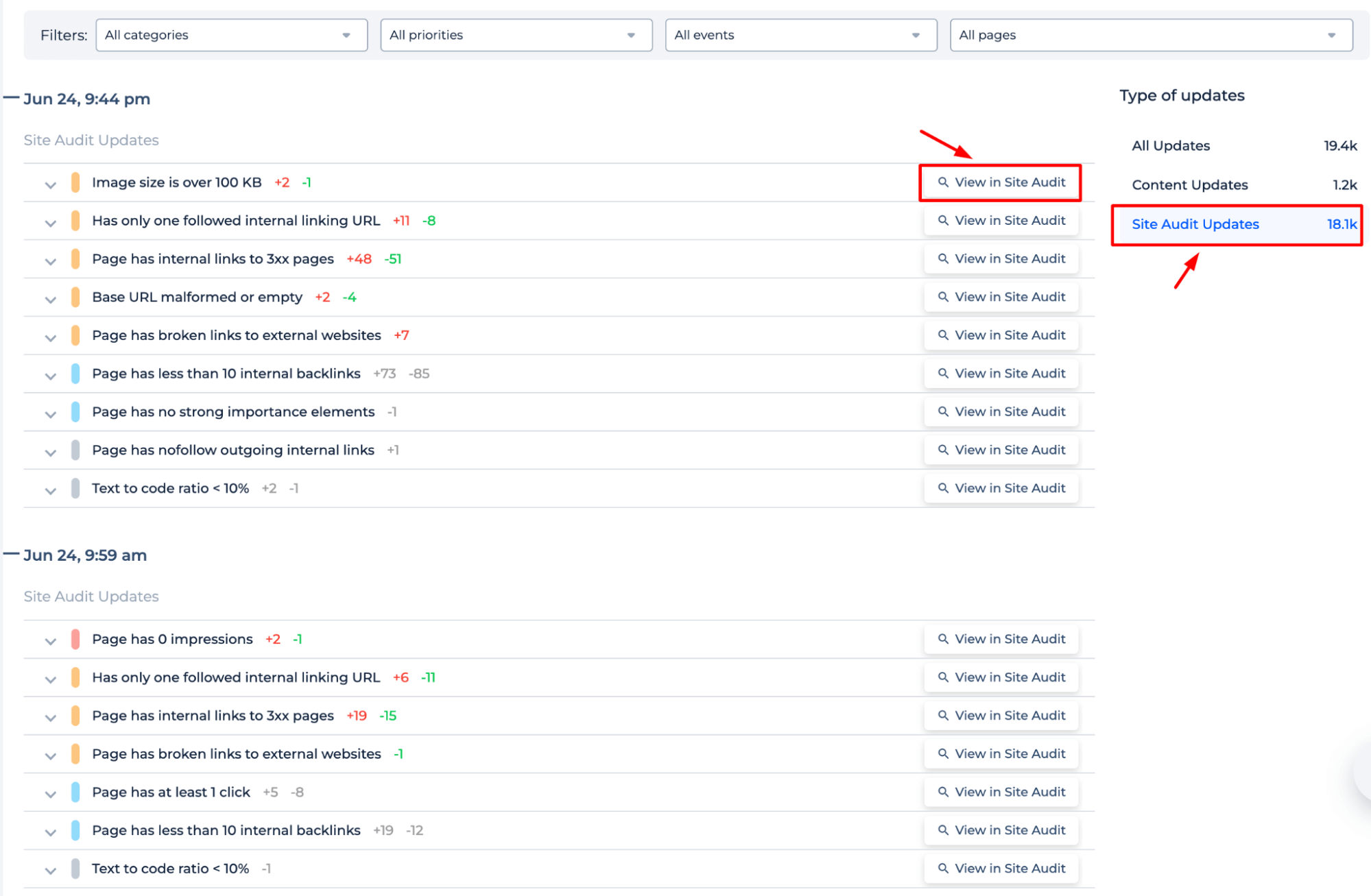
3. Sitecheckers Site Audit
The Site Audit provides real-time tracking of your website’s performance, focusing on critical issues, warnings, opportunities, and notices. It categorizes issues by links, content relevance, page speed, and more, offering a detailed and visual representation of affected pages.
Key features include actionable insights for direct issue resolution, options to view all pages or external links, and the ability to sort and filter issues by count or category. This tool ensures continuous monitoring and maintenance of your website’s SEO health, keeping it optimized and competitive.
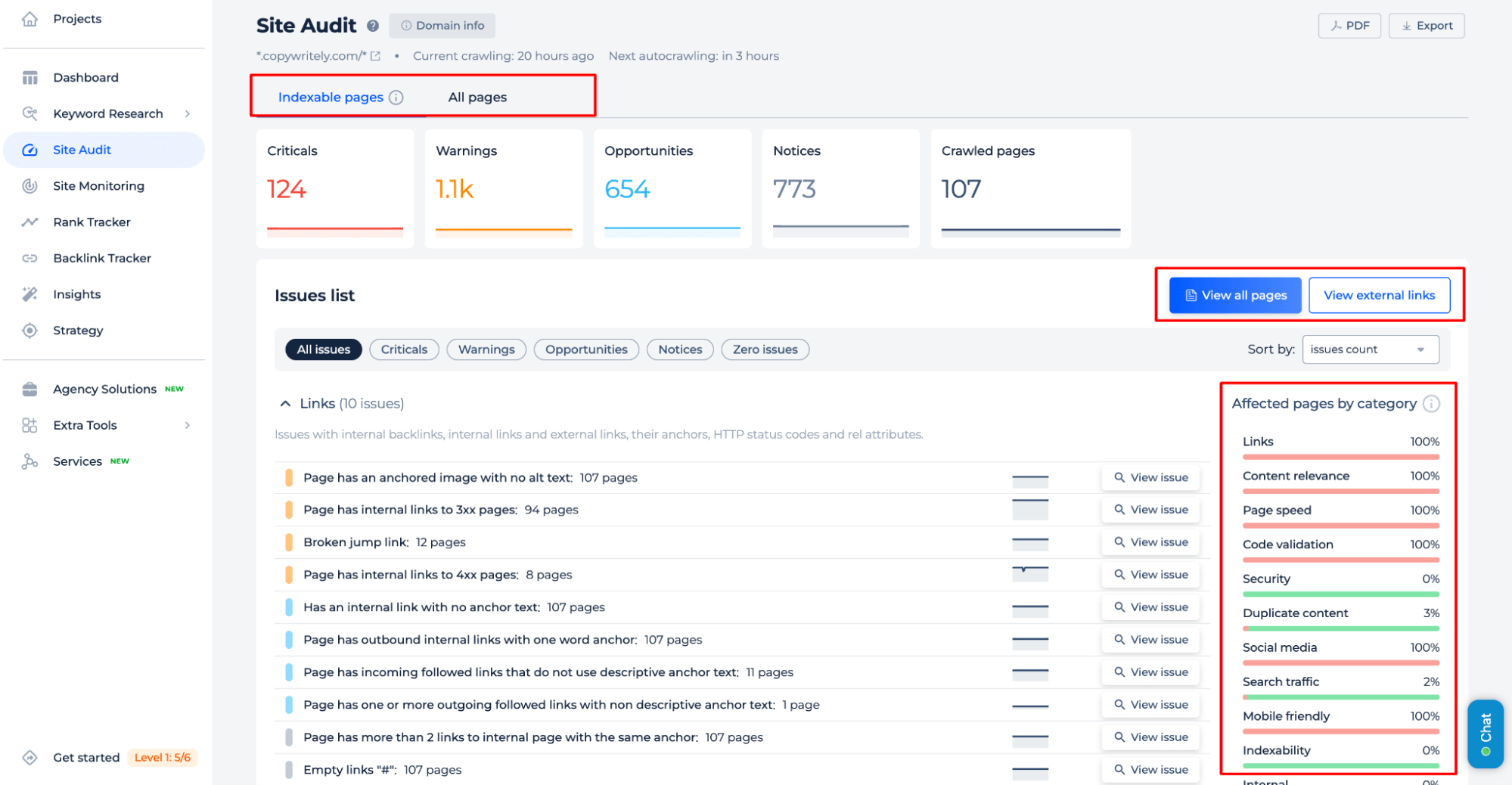
4. Keyword ranking monitoring by Sitechecker
SEO Rank Monitoring offers a robust solution for monitoring SEO performance. It tracks keyword rankings, compares them with competitors, and provides daily updates and detailed performance reports. The tool offers historical data, localized tracking, and custom alerts for significant changes. Integration with Google Analytics and Google Search Console gives a comprehensive view of your SEO efforts, enabling informed, data-driven decisions. Setting up monitoring for your keyword or page positions is very easy. To start, simply create a free account in Rank Tracker and follow these steps:
Step 1: Set up keyword rank tracking
You can quickly start tracking your preferred keywords using one of three methods: receiving keyword suggestions, utilizing Google Search Console data, or importing keywords from an Excel file.
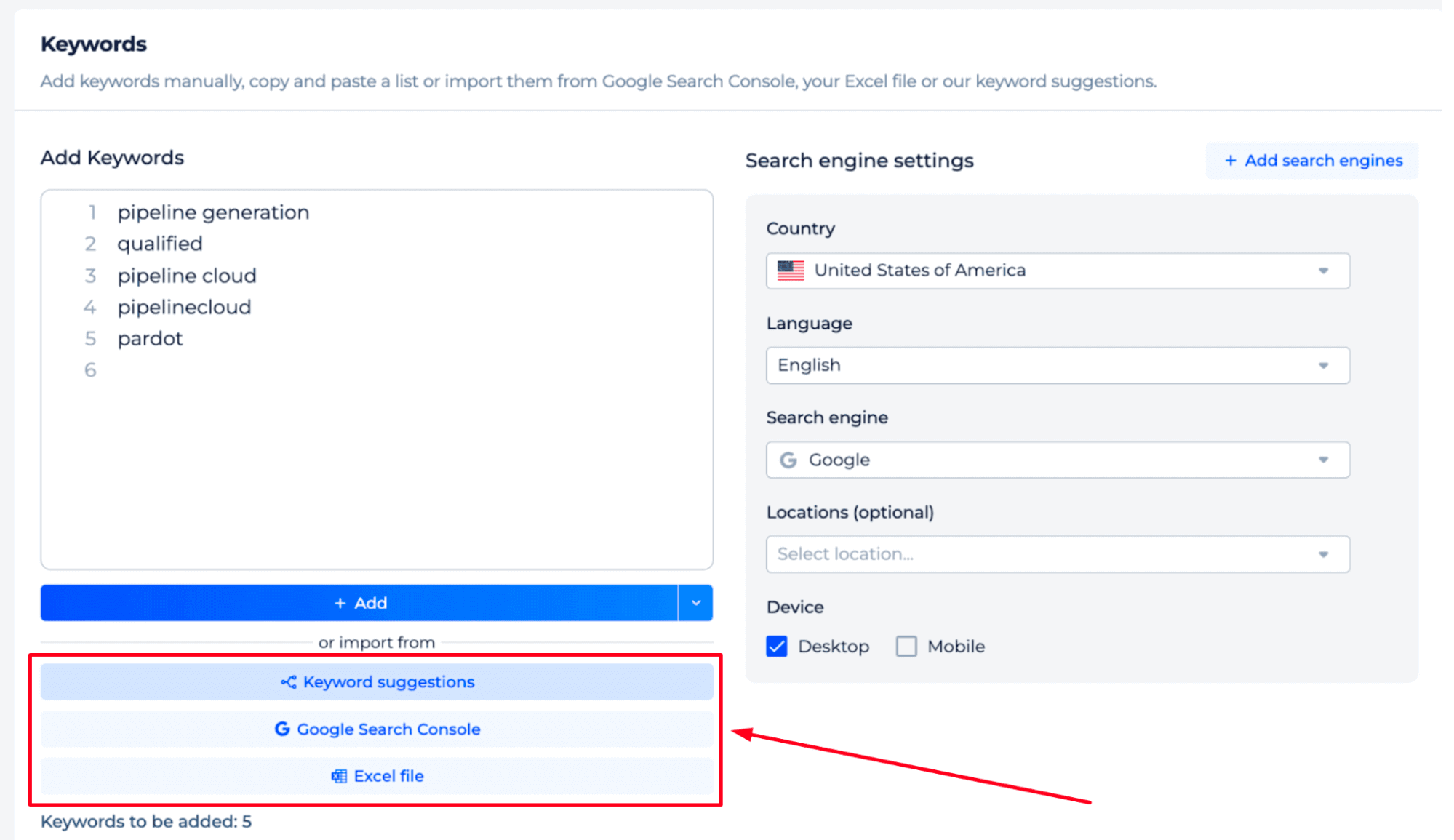
You can adjust search engine settings on the side panel, specifying targets and refining preferences for search engines, locations, languages, and devices like desktop or mobile. Once setup is complete, click ‘Add’. The ‘Manage Keywords’ feature below allows you to group keywords and organize them by pages, aligning with your promotional strategy.
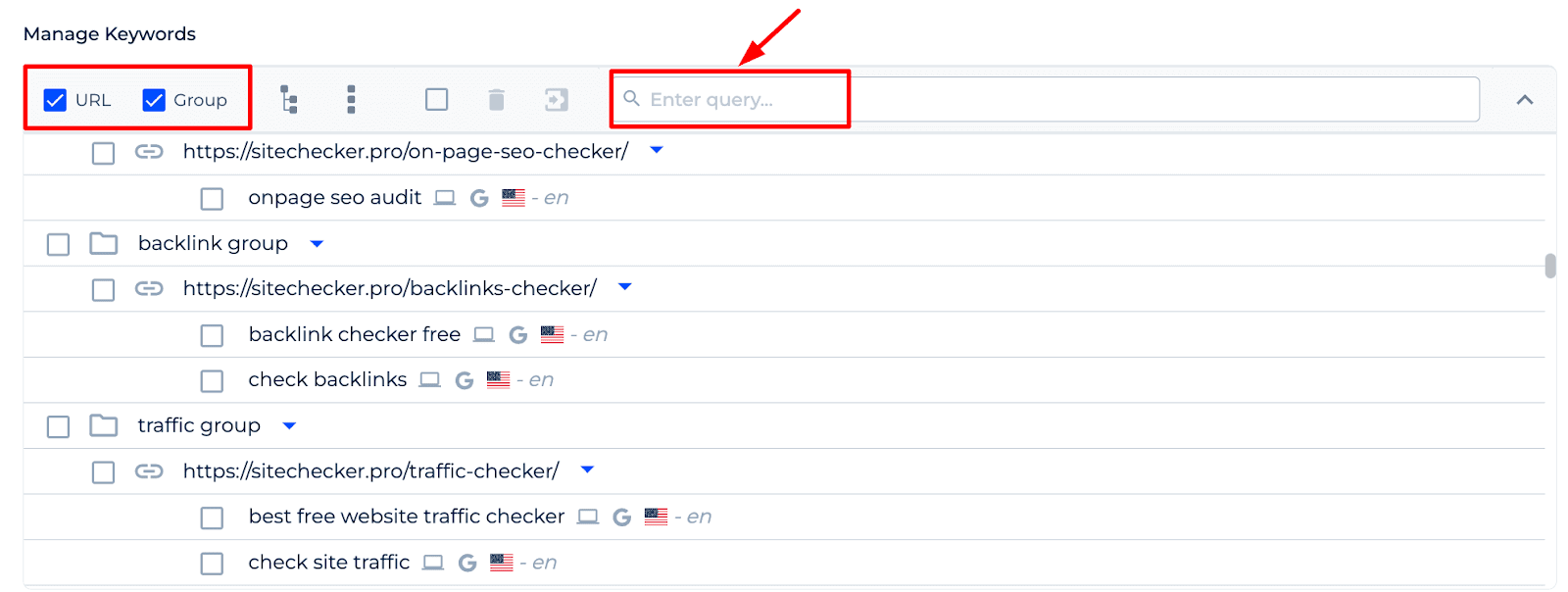
Step 2: Get the results
After adding the tracking keys, go to the project settings in the upper right corner to set up alerts about your rankings.
The Rank Tracker Dashboard provides essential data for monitoring your site’s keyword performance. It displays keyword positions, search volumes, and trends over different periods (1 day, 7 days, 30 days, 90 days).
The table below also highlights changes in rankings, SERP features, and the URLs associated with each keyword. You can also identify which keywords are being cannibalized by ranking for multiple URLs.
You can also monitor keywords that your site is ranking for even if you don’t have a specific page that matches those keyword queries.

The Competitor feature in Rank Tracker provides critical insights into your website’s keyword performance and visibility. It shows rankings across various positions, overall visibility percentage, and detailed comparisons with top competitors. This tool helps you monitor keyword trends, assess SEO effectiveness, and identify opportunities for improvement to stay competitive in your industry.
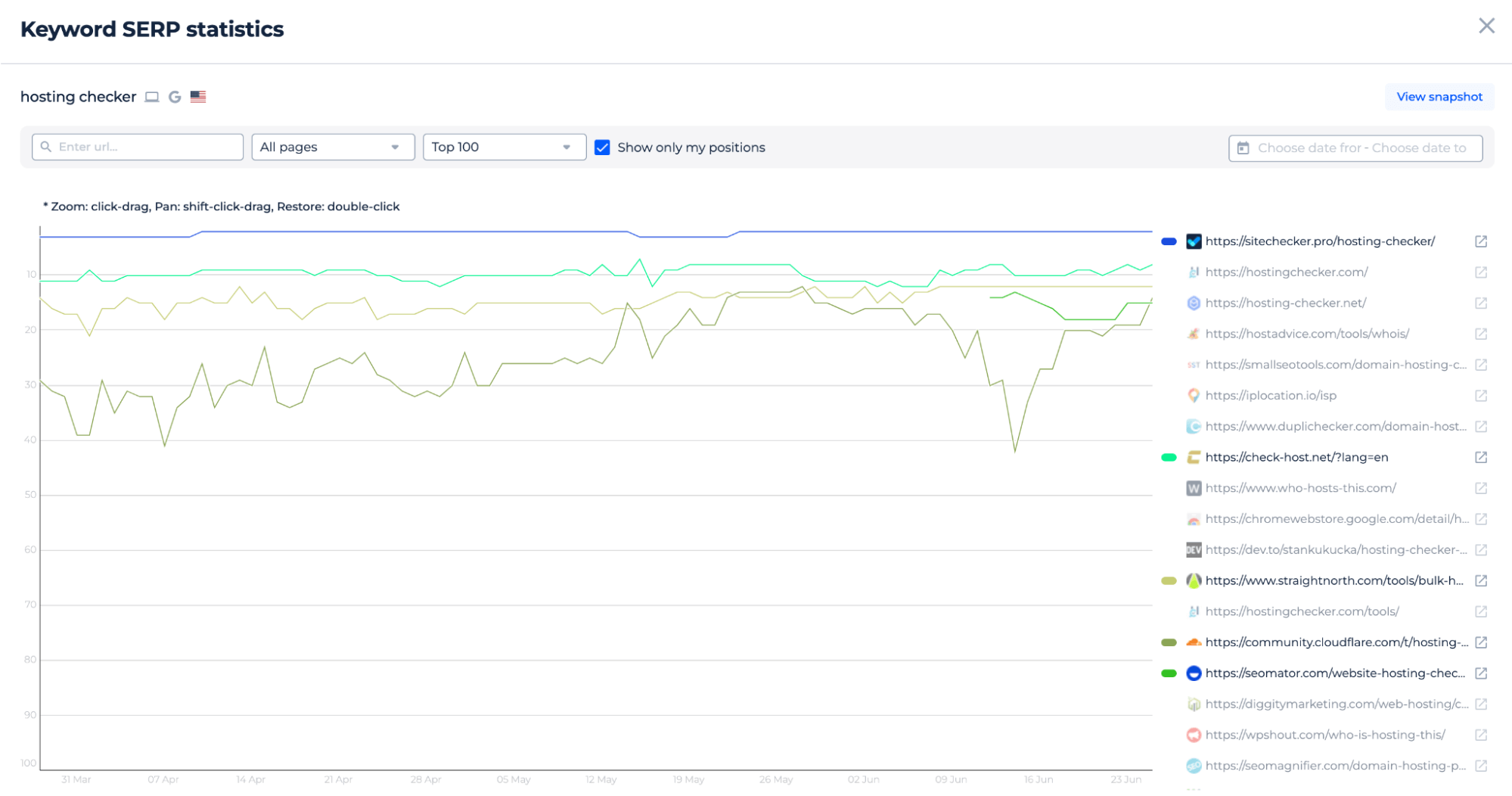
5. The competitor’s tab in the Rank Tracker
The Competitor feature offers essential insights into your competitor standings. It displays rankings across various positions, overall visibility percentage, and detailed comparisons with top competitors. The Competitor Monitoring Tool helps you track keyword trends, evaluate SEO effectiveness, and stay competitive by identifying areas for improvement and opportunities in your SEO strategy.
6. SEO Alerting
The SEO Alerts enable you to receive notifications via email or Slack for key events affecting your website’s performance. Alerts cover weekly and monthly performance reports, site audit completions, site downtime, indexability changes, broken pages, WordPress updates, HTTP header changes, robots.txt updates, tracking code removals, content changes, social media card updates, meta viewport tag changes, SSL certificate status, and domain expiration warnings. This ensures users can promptly address any issues impacting their site’s SEO.
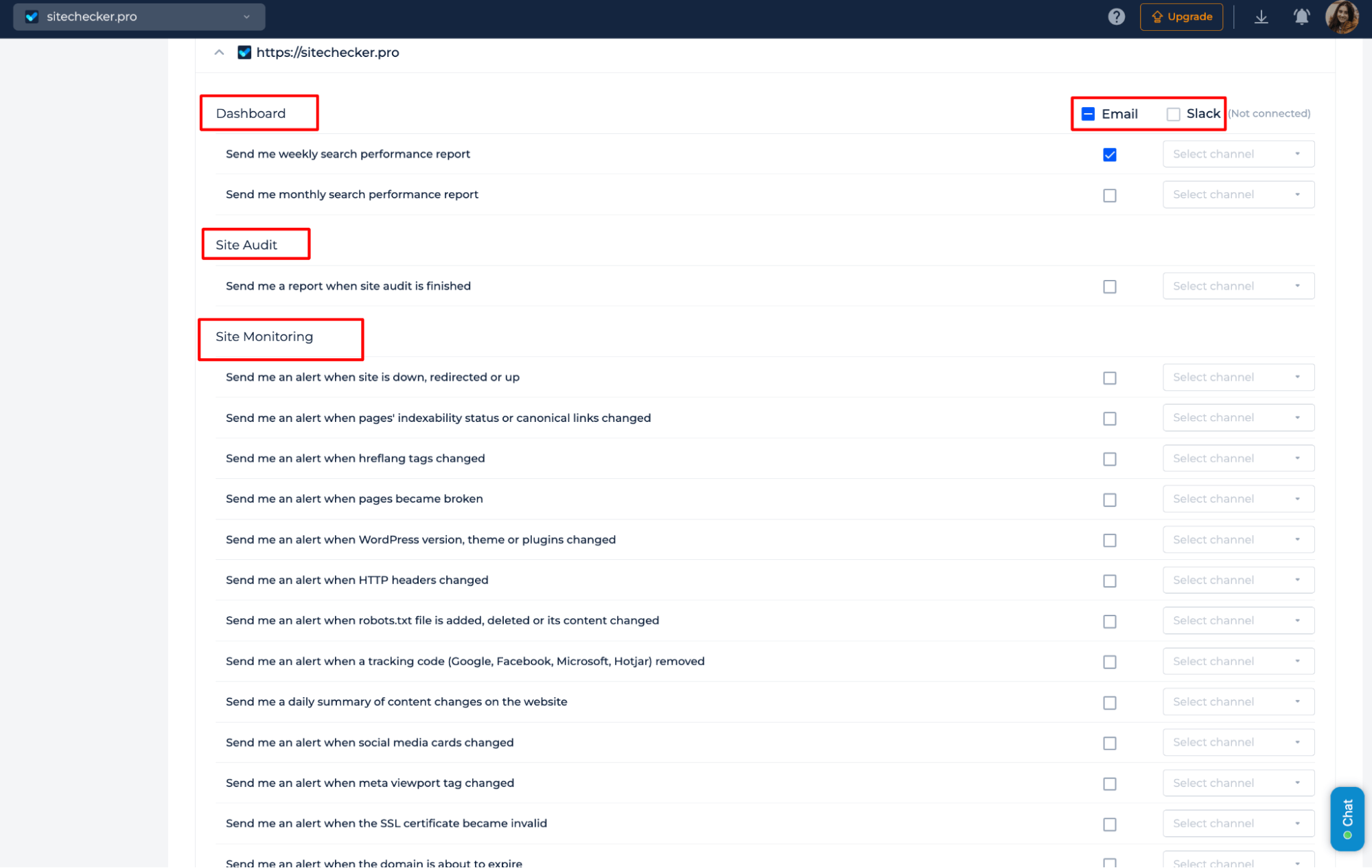
The Rank Tracker Alerts feature allows you to receive daily, weekly, or monthly reports on your keyword rankings. These alerts keep you informed about changes in your SEO performance, providing timely insights and updates to help maintain and improve your search engine rankings.
Chrome Extension for On-Page SEO
The Sitechecker Chrome Extension for On-Page SEO offers a range of monitoring features for optimizing web pages. It performs comprehensive SEO checks, including analysis of meta tags, keyword density, and header tags. The extension also inspects links, ensuring internal, subdomain, and external links are functional. It evaluates page crawlability, indexing, canonical URLs, and hreflang tags.
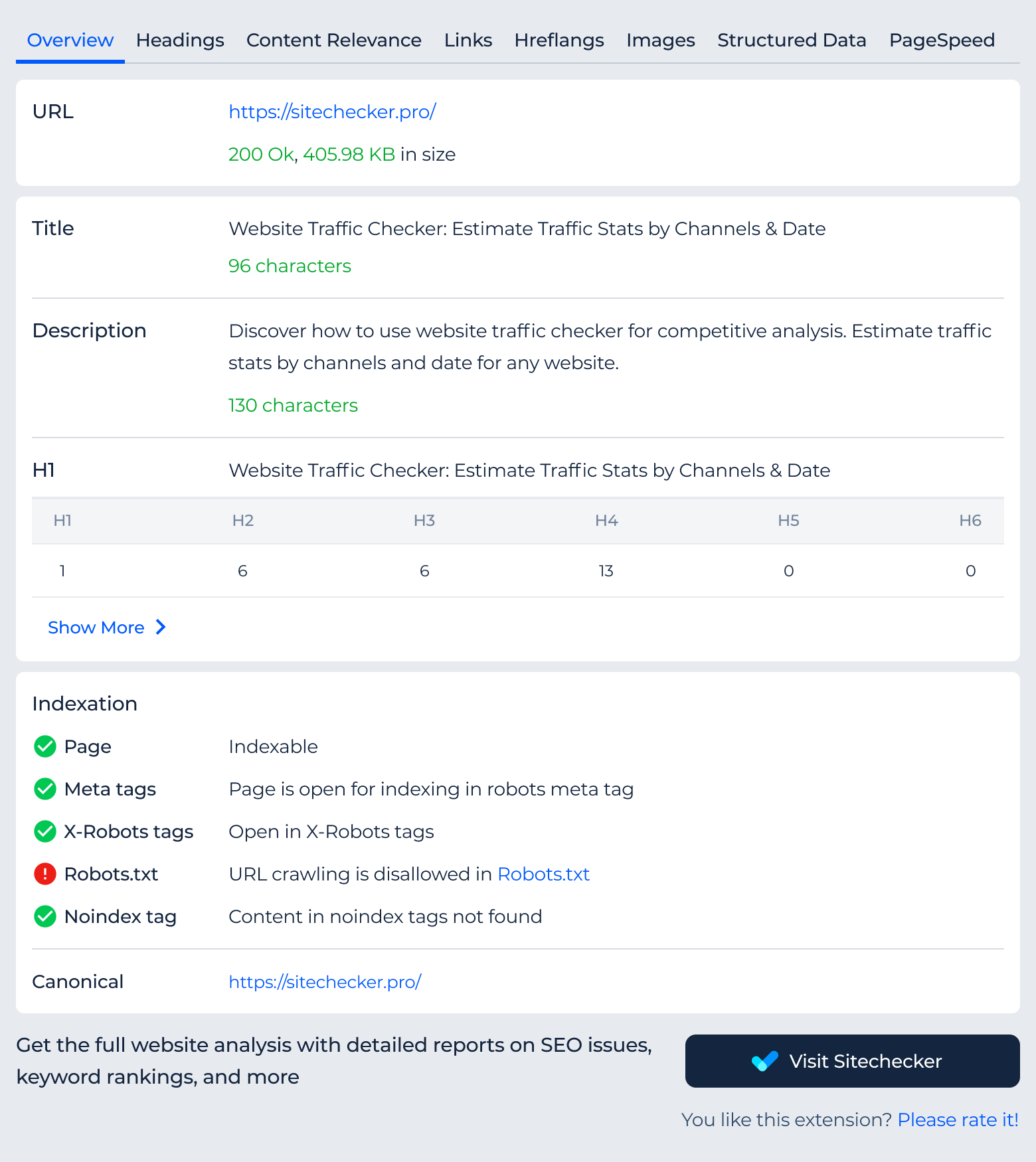
Additionally, it checks image alt and title attributes and verifies Open Graph tags for social media. The extension provides PageSpeed insights for both mobile and desktop devices, etc.
Google Search Console
The Google Search Console provides powerful SEO monitoring capabilities, and allows to track key performance metrics such as total clicks, impressions, average CTR, average position over time and more. It enables detailed analysis of top queries, pages, countries, devices, and search appearances. This helps identify trends and areas for improvement, ensuring your website’s content aligns with user intent and performs optimally in search results.
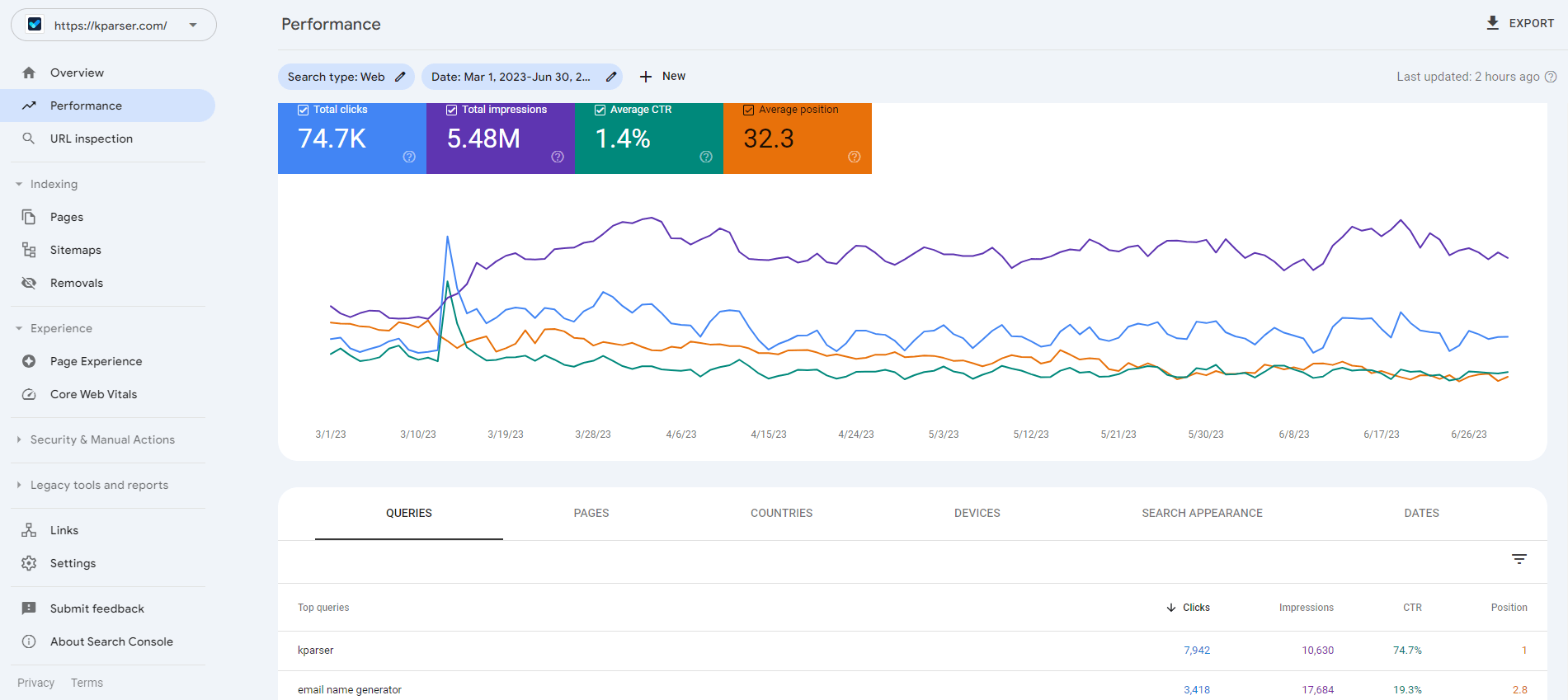
Google Analytics 4
Google Analytics 4 (GA4) offers SEO monitoring capabilities by tracking user engagement metrics such as total users, new users, average engagement time, and total revenue. The interface provides insights into user activity, including real-time users, top countries, and performance trends over time. It also shows where new users are coming from and the top campaigns driving traffic. This helps in understanding user behavior and optimizing SEO strategies effectively.
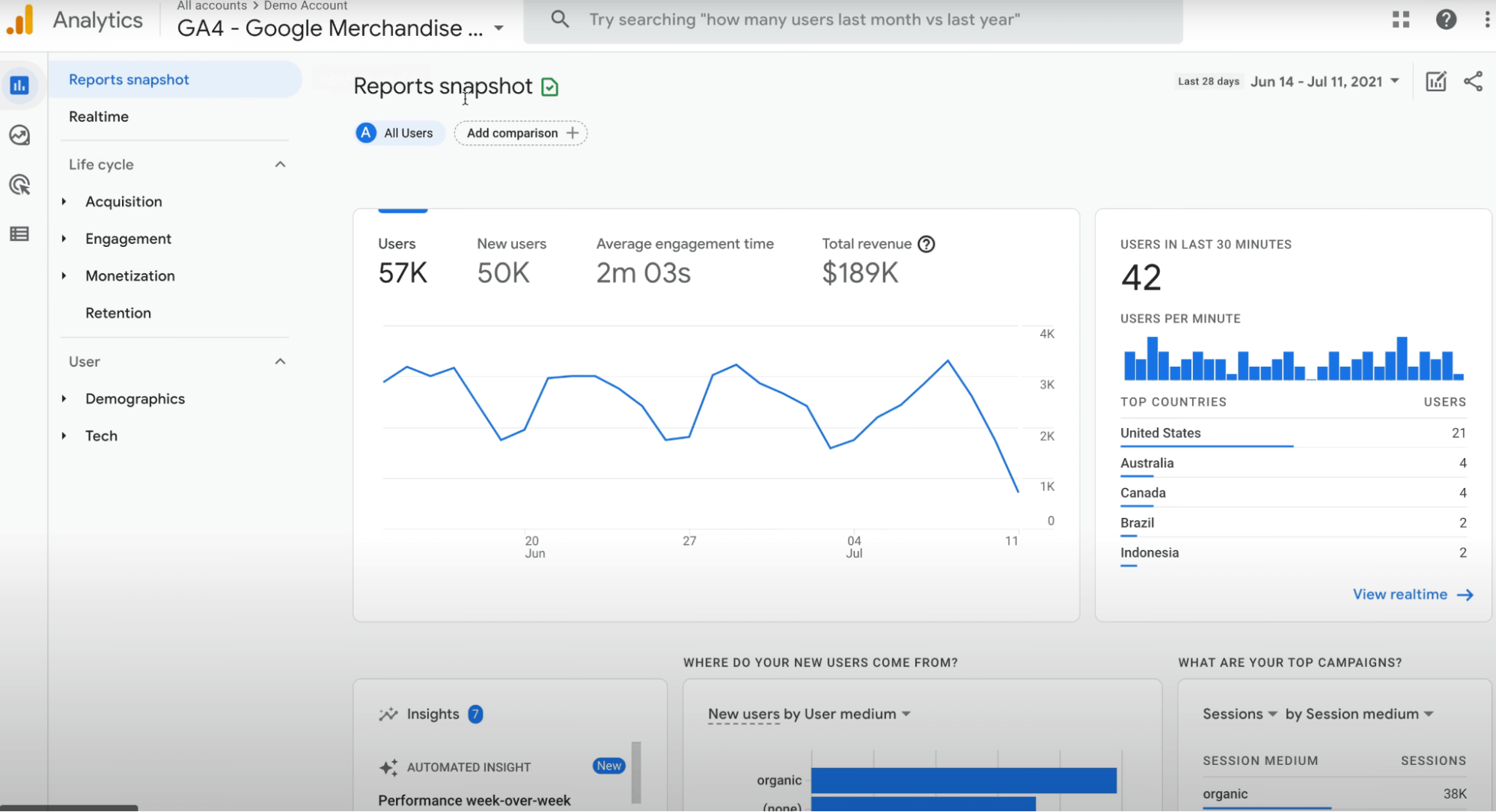
Conclusion
Automated SEO Monitoring continuously tracks and analyzes key metrics like keyword rankings, organic traffic, backlinks, and site performance to enhance a website’s visibility and ranking on SERPs. By regularly observing these factors, it helps maintain search engine rankings, improve organic traffic, enhance user experience, and stay ahead of competitors. Essential components include keyword tracking, traffic analysis, backlink monitoring, technical audits, competitor analysis, content performance evaluation, algorithm updates, and user behavior metrics. Tools like Sitecheckers SEO Monitoring Dashboard, Site Audit, Rank Tracker, and SEO Alerts provide comprehensive insights and actionable data for optimizing SEO efforts.
